November 21, 2013 in Ukraine, anti-government protests began as a reaction to the decision of the Cabinet of Ministers of Ukraine to suspend the process of preparing for the signing of the Association Agreement between Ukraine and the European Union and spread significantly after the violent dispersal of a demonstration in Kyiv on the night of November 30. As part of the protests at the end of 2013, there were, in particular, rallies, demonstrations, and student strikes.
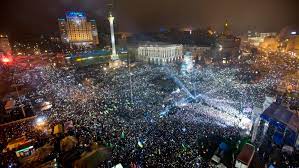
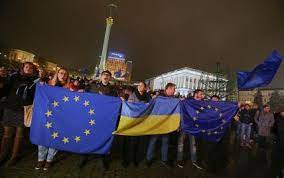
In general, these protests were aimed at preserving the legally established geopolitical course of Ukraine towards Europe, which meant for Russia not only the further exit of Ukraine from Russian control, but also Ukraine’s receipt of economic, political, and in the long run, military guarantees of maintaining this course.
The result of the victory of the Revolution was the removal of President Yanukovych from power and his escape to Russia, the restoration of the 2004 constitution of Ukraine, the abolition of dictatorial laws, and the appointment of early presidential elections. The change of power drastically reduced the power of Russia’s influence on Ukraine.
The Revolution of Dignity was the pretext used by Russia to start the aggression, which entered a new phase from February 2014.
Thus, on February 23, 2014, pro-Russian and pro-Ukrainian rallies began (the latter were attended by a large number of Crimean Tatars led by Mejlis leader Refat Chubarov).
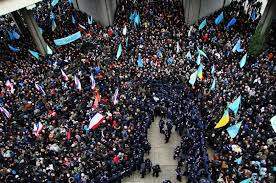
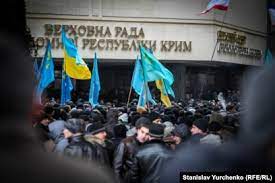
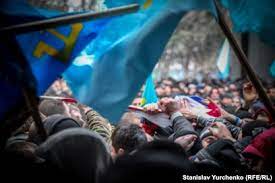
On February 27, unknown armed people without insignia (probably former fighters of the “Berkut” special unit disbanded on February 25, which participated in the suppression of protests in Kyiv, and Russian special forces) seized and blocked the Verkhovna Rada of Crimea and other administrative buildings, airports in Simferopol and Sevastopol , communication institutions, mass media, etc. At their request, a part of the deputies came to the Crimean Parliament, who voted for holding a referendum on expanding the autonomy of Crimea on May 25, 2014, the day of the presidential elections in Ukraine.
At the same time, the presence of a quorum is doubtful, since the mass media were not allowed to attend the meeting. Soon, the date of the referendum was changed twice: first to March 30, and then to March 16. The wording of the question was also changed: instead of expanding autonomy, it was about joining Russia. However, since Ukraine is a unitary state, the question of secession of the region could only be decided by a nationwide referendum. With this in mind, even before the referendum was held, the leaders of the EU, the USA and many others recognized it as illegal and its results invalid.
On the night of February 27, the buildings of the Verkhovna Rada and the Government of the ARC were seized by unknown armed persons and Russian flags were installed on the buildings.
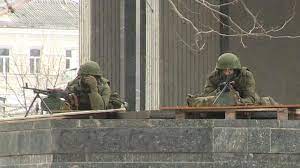
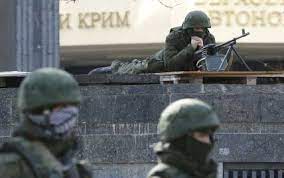
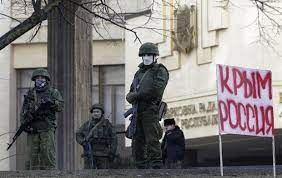
According to People’s Deputy Serhiy Kunitsyn, professionally trained people armed with automatic carbines, machine guns, grenade launchers, etc. seized the administrative buildings. According to media reports, the center of Simferopol was blocked by law enforcement officers, who raised the alarm, and the movement of public transport was restricted.
On March 16, 2014, a “referendum” was held on the status of Crimea, in which, according to official Russian data, 96.77% of residents of the ARC and the city of Sevastopol voted for the reunification of these territories with the Russian Federation.
On March 17, the Verkhovna Rada of the Republic of Crimea proclaimed the independence of the Republic of Crimea, and on March 18, in the George Hall of the Moscow Kremlin, Russian President Vladimir Putin, together with the self-proclaimed Chairman of the Council of Ministers of the Republic of Crimea Serhii Aksyonov, the Speaker of the Supreme Council of the Republic of Crimea Volodymyr Kostantynov, and the Chairman of the SMDA, Oleksiy Chaly, signed the Agreement on the Admission of the Republic of Crimea to composition of Russia.
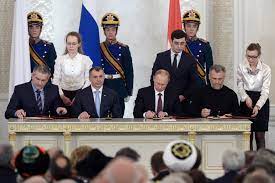
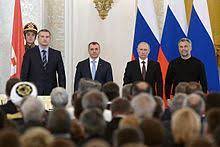
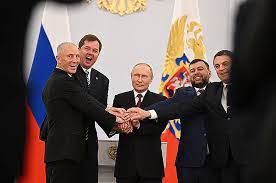
On March 21, the Council of the Russian Federation adopted the law on the ratification of the Treaty of March 18 and the law on the formation of new subjects of the federation — the Republic of Crimea and the federal city of Sevastopol, confirming the annexation of these regions by Russia.
This is how the Russian-Ukrainian war began. The war is not for life, but for death, aimed at the total destruction of the Ukrainian nation and statehood.
Not limited to Crimea, Russian special services and separatist formations controlled by them seize administrative buildings in parts of Donetsk and Luhansk regions, try to implement similar plans in Odesa, Kharkiv, Zaporizhzhia, etc. However, they encounter significant opposition from the public and decide to limit themselves to the escalation of the conflict on the territory of Donetsk and Luhansk regions.
This is how the active phase of hostilities in Ukraine begins, which continues with varying intensity to this day, transforming into a full-fledged war and taking and maiming thousands of human lives.
An important moment of this war is the unprecedented transformation of Ukrainian society. Thus, only in the first days of the full-scale invasion, thousands of volunteers of various ages joined the ranks of the Territorial Defense Forces and the Armed Forces. self-organized volunteer movementwhich systematically directs its power to support both troops and various humanitarian programs.
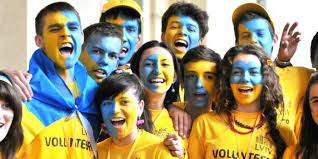
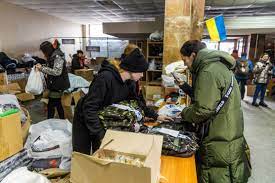
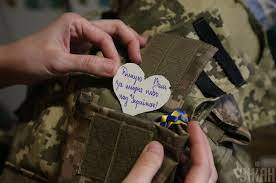
And, if the all-Ukrainian volunteer movement unites people of different wealth, then it is worth analyzing the participation of the richest Ukrainians, each of whom has been awarded a world rating Forbesin the approach of our victory.
That is why we are starting a series of publications about well-known Ukrainian billionaires who remained loyal to the state and the people:
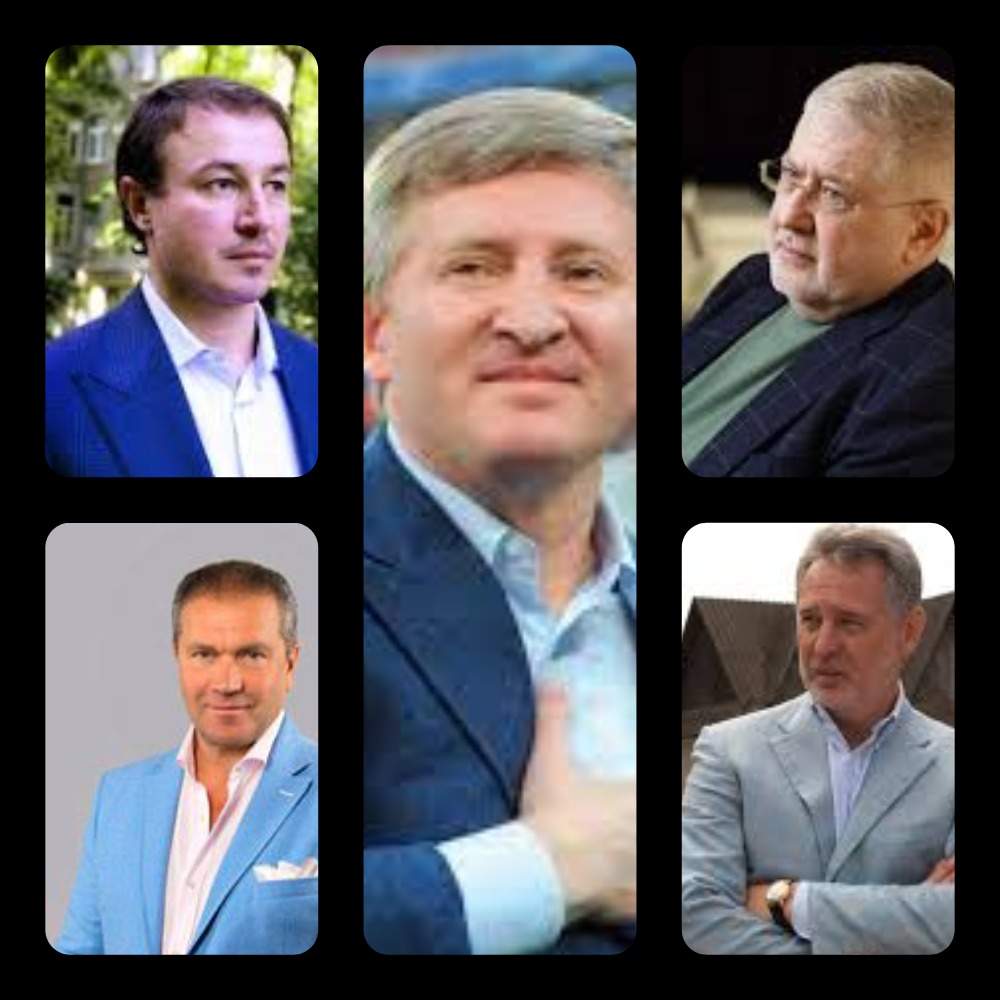
In the next part of the publication, we will tell you in detail about the contribution of each of the mentioned persons to the approaching victory of Ukraine in the war.

